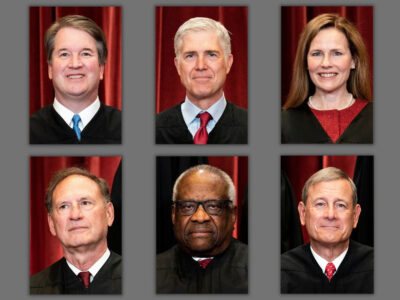Upcoming Regulatory Cases in the Supreme Court
Two pending cases could result in big cuts to agency powers
Three weeks from today, the Supreme Court starts its 2023 Term. There are two blockbuster cases on the docket. In one case, the issue is whether to overrule the Chevron case, which has been foundational to administrative law for the past four decades. In the other, the issue is agency power to sanction violations of the law. Given the Court’s conservative supermajority, there’s a real threat to the power of agencies like EPA to issue regulations and enforce the law
The Threat to Agency Regulatory Power
The Chevron case gives agencies leeway in interpreting the law when issuing regulations. Under Chevron, if a statute is ambiguous or has a gap, courts defer to reasonable interpretations of the statute by agencies. The Court assumed that Congress wants agencies to have primary responsibility for interpreting the laws that they implement — something that has now been confirmed by empirical evidence. The Court also emphasized that agencies are democratically accountable in a way that judges are not. Apart from regulation of financial markets, agency heads report to the President, so in effect Chevron expanded President’s power to pursue their regulatory agendas.
Chevron was fervently embraced by conservatives like Justices Scalia and Thomas — until Barack Obama took office, when they started having second thoughts. With a conservative super-majority entrenched by Trump, the Court agreed to hear Loper Bright Enterprises v. Raimondo specifically to decide whether to overrule Chevron. This case could be one more milestone in the Court’s anti-regulatory campaign.
Loper Bright involved a federal fisheries law, under which the government can require fishing boats to carry independent monitor to be sure they’re comply with fishing limits. The law doesn’t specify who pays for the monitors. NOAA, the agency in charge of enforcing the law, issued a regulation requiring fishing companies to pay, just as they would have to pay for any electronic monitoring equipment they were required to carry. (Actually, although NOAA approved the regulation, it was actually written by the local fishing council.) The lower court said that the regulation was reasonable and upheld it under Chevron. The government doesn’t really have the money to pay monitors, so a win for the fishing company would likely give it free rein to violate fishing limits.
I’ll write more about this case when we get closer to oral argument, which hasn’t yet been scheduled. For now, it’s enough to say that the Court is once again likely to give settled law a hard knock if not to upend it entirely.
The Threat to Agency Enforcement Power
A second case, SEC v. Jarkesy, challenges the long-established power of administrative agencies to issue civil penalties. The case involves the securities laws, but these enforcement powers are also an important tool for EPA in enforcing pollution laws. An administrative law judge had found Jarkesy and others guilty of a series of misrepresentations aimed to fleecing investors. The SEC ordered Jarkesy and the others to pay a $300,000 civil penalty for violating the law. The court of appeals — not surprisingly, the rightwing Fifth Circuit — held that civil penalties can only be assessed through a jury trial.
In another ruling in the case, which I find really off the wall, the Fifth Circuit said that Congress had unconstitutionally delegated power to the agency by giving it the choice between using administrative enforcement or a civil case to go after violators. This is the kind of procedural choice that enforcement officials make all the time. For instance, the Justice Department can file criminal charges against antitrust violators (requiring a jury trial) or file suit for an injunction (no jury trial). It can decide to get evidence through a search warrant or through a grand jury subpoena. Each of these choices involves just as much discretion as the choice between agency and civil enforcement.
I should mention one more issue in the case, although it may not apply to EPA. Congress has given civil service status to administrative law judges (agency hearing officers) so that they can decide cases free from political influence. Jarkesy is also challenging the penalty on the ground that this protection for administrative law judges is unconstitutional. If the Court rule on broad grounds, EPA could impacted, but there is a narrower argument in the case that applies only to a subset of agencies — those agencies whose heads are themselves protected from presidential approval. EPA doesn’t fall in that category. A broad rule, however, would open hearing officers to greater political influence in all agencies, including EPA. Ironically, a victory on this issue by Jarkesy would be more likely to harm the targets of agency enforcement actions than help them.
* * * *
To varying degrees, all the members of the conservative supermajority are uncomfortable with the modern regulatory state, rising to open antipathy on the part of the ultra-conservatives like Thomas. This Supreme Court term will provide further evidence of how strongly the Court is dedicated to a return to the pre-New Deal world.
Reader Comments
9 Replies to “Upcoming Regulatory Cases in the Supreme Court”
Comments are closed.







The much greater. and destructive problems for our democracy and the human race are out of control corruption of justices and politicians that are controlled by the Power of Money.
If we continue to fail to protect and perpetuate an acceptable future quality of life for our newest generations then our older generations, that had the greatest advantages in history, are the worst failures in history.
Please dedicate all necessary UC resources to making the right things happen in time.
Prof. Farber, on Friday, U.N. Secretary-General Antonio Guterres told G20 bloc leaders that they have the power to reset a climate crisis is “spinning out of control”.
The UN has proven they need all the help they can get from the Best of the Best and universities like UC are most truly our Last Resort if we are going to save quality of life for our newest generations.
Prof. Farber, I pray that the Powers that Be in UC have given their ultimate priority and urgency to protecting and perpetuating quality of life for our newest generations instead of the Power of Money that far too many institutions have threatened our survival with.
Please document this by publishing your solutions and implementation schedule.
This is beyond depressing, the lives of the entire human race are in gravest jeopardy and all UC leaders can do is invoke what Nicholas Dirks said in an interview “— so many intellectuals don’t want to take on the sort of complications and impurities that come from being public”, not even to help us save the human race.
During the Equal Rights era in the 60s when I went to Berkeley you inspired students like myself to Fight Like Hell for the Human Race, when did the Power of Money destroy that dedication?
So UC environmental leaders don’t have solutions and implementation schedules to post even today when the UN admits they have failed because the Power of Money has destroyed their efforts to save the human race and they need all the help they can get because the climate crisis is “spinning out of control”.
Prof. Farber, you are the best environmental leader at UC, and when the Powers that Be refused to implement your recommendations to reorganize environmental resources at Berkeley so accomplishments like implementation schedules could be expedited that proved that my concluding comment above is most tragically true.
Thanks for your dedication to trying to protect a quality of life future for our newest generations.
FINIS?:
How Close to the End of the End of These Warnings Are We?
Scorching August Sets World on Path Toward One of Hottest Years on Record
https://www.bloomberg.com/news/articles/2023-09-14/scorching-august-sets-world-on-path-toward-one-of-hottest-years-on-record?srnd=green
It’s time for a Save The Human Race Movement, similar to the Free Speech Movement in the 60s.
https://www.theguardian.com/environment/live/2023/sep/17/nyc-march-end-fossil-fuels-alexandria-ocasio-cortez
P.S. to above reply:
WHAT WE ARE DOING NOW IS NOT WORKING!!!:
Climate Science Is under Attack in Classrooms – Schools are a growing battlefield in climate politics as conservative states reshape their curriculum to downplay people’s contribution to rising temperatures
https://www.scientificamerican.com/article/climate-science-is-under-attack-in-classrooms/